With another lord chancellor gunning for the 20-year-old Human Rights Act, how do lawyers evaluate its legacy? Melanie Newman reports
The low down
When the Human Rights Act came into force 20 years ago, it was meant to bring home rights that UK citizens previously had to head to Strasbourg to assert. All subsequent legislation must be compliant with it, and a court could direct parliament to redraw past legislation that was not. This should have been a proud marker – it enshrined the European Convention on Human Rights which claimed Churchill and eminent Conservative lawyers as its handmaids. But prominent cases raising human rights points have upset governments and much of the press. Lord chancellors promising the act’s removal come and go – it remains. Two decades on, how should we view the Human Rights Act?
It is 20 years since the Human Rights Act came into force, incorporating the principle of the European Convention on Human Rights into British law. For many lawyers, the HRA has proved the most useful tool in litigation, allowing claims for wrongs which would not previously have been compensated. But it has also been the focus of frequent controversy and disagreement. And, it seems, even its most ardent proponents cannot agree on its influence.
Recalling the first few years of the act, eminent human rights lawyer Sir Geoffrey Bindman QC, founder of Bindmans LLP, tells the Gazette: ‘We were already bound by the convention. People talk about the HRA as though it were a huge departure, but it wasn’t at all.’ He adds: ‘And pretty much everything in the convention was already part of the English common law.’
It remains a question, says Bindman, what the difference would have been had the HRA not been passed. ‘You may find if you examine a lot of cases where the HRA was relied on, the result would have been the same anyway.’
In contrast John Halford, a partner at Bindmans, believes the HRA has ‘undoubtedly made a huge difference’. Many of the most important cases have gone significantly beyond the position that the common law held previously, he explains. ‘The trouble with Geoffrey’s analysis is that it depends on judges being willing to develop the common law as a tool for rights protection.’
In Laporte v Chief Constable of Gloucestershire (2006), the House of Lords held that anti-war protesters’ rights of freedom of assembly and free speech were violated when the police detained them and prevented them attending a demonstration. The law lords’ judgment in Laporte describes the English common law approach to freedom of assembly and free speech as ‘hesitant and negative’, citing a 1959 textbook on constitutional law which noted that ‘at no time has there in England been any proclamation of the right to liberty of thought or to freedom of speech’, and that ‘it can hardly be said that our constitution knows of such a thing as any specific right to a public meeting’. The HRA was aptly labelled a constitutional shift in this regard, the judges added.
A second set of cases that illustrate a similarly important shift are those that imposed a positive duty on public authorities to find out who is responsible for crime and other forms of wrongdoing. The paradigmatic example of that was the 2018 Worboys case. Victims of the ‘black cab rapist’ argued that by failing to properly investigate the serial rapist, the Metropolitan Police had breached their rights under Article 3 of the ECHR not to be subjected to torture or to inhuman or degrading treatment.
‘This kind of investigatory duty is not part of the common law in a way that could be enforced,’ Halford says.
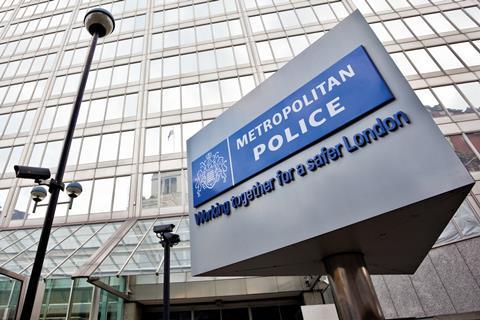
Protection of the vulnerable
A third important group of cases involves protection of the vulnerable. Merry Varney, a partner at Leigh Day, mainly brings cases related to health and social care and has no doubt that the HRA is responsible for huge strides in that context.
In a 2014 case, the Court of Appeal said a failure to inform or consult a hospital patient or her family before imposing a Do Not Resuscitate order on her was a breach of her Article 8 rights. Article 8 lays down a ‘right to respect for private and family life, home and correspondence’, which has been interpreted to include personal autonomy and the right to make choices regarding one’s own life without interference by the state.
This year, amid reports in the early days of the Covid-19 pandemic of DNRs being imposed on care home residents as policy, the daughter of the applicant in the 2014 case threatened legal action against the government. ‘The government is due to publish guidance on DNRs shortly, which will centre on Article 8,’ says Varney. ‘This is a good example of human rights in practice. Without Article 8 we would not have been able to take that action.
‘We don’t have a free-standing right to dignity and personal autonomy outside of the HRA – we have privacy rights which come from the Data Protection Act but nothing else. There may be a negligence claim but that isn’t the same as a recognition that your human rights have been violated.’
As far as she is concerned, the HRA has lived up to expectations in terms of what it has achieved for the vulnerable. ‘But it could do more,’ she says. ‘I’d like to see a lot more consideration of human rights at the planning and proposal stages of policy.’
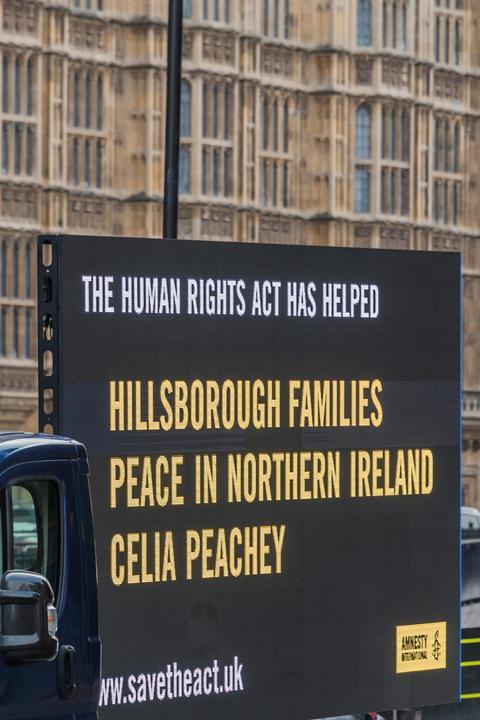
The act is ‘still bedding in’ in some areas, she adds, citing examples such as poor treatment of children in the care system and delays in decisions on people without mental capacity: ‘Being able to argue that there is a compensatable wrong will hopefully bring about some progress in those areas.’
There are other areas of potential scope for expansion of the HRA’s influence, as Kingsley Napley partner Sophie Kemp explains. The firm is acting for interveners in a claim against Shell in which it is argued that the UK parent company has a duty of care to Nigerians allegedly affected by leaks from pipelines operated by its Nigerian subsidiary. Shell is disputing jurisdiction and duty of care by the British entity to the Nigerians.
‘While the HRA has had a clear impact on public bodies and case law, it hasn’t yet had the same effect on corporate conduct,’ Kemp says. ‘The landscape is likely to change following the introduction of the UN guiding principles on business and human rights – there are various initiatives attempting to enshrine them in UK law.’ A mandatory ‘due diligence’ law has been mooted, which would require corporations to monitor supply chains for human rights abuses.
There is also room for improvement in that some cases have little impact beyond individual judgments, meaning the same failings happen again and again. ‘There needs to be a national oversight mechanism,’ argues Jo Eggleton, a partner with Deighton Pierce Glynn who has acted in several cases arising from prison suicides. A series of coroners’ ‘prevention of future deaths’ (PFD) reports identified similar failings, but recommendations were not acted on.
‘There is no system to ensure that lessons learned result in change,’ Eggleton says.
However, whether the next decade will see the act’s influence expand or be curtailed is uncertain. As at several other points in its lifetime, a Conservative government is pressing for amendment. A review of the HRA is planned, similar to that currently examining judicial review, in line with the Conservative manifesto promise to ‘update’ the legislation.
Given its founding on universal rights, it is perhaps surprising that the act has been so controversial. Where there has been wider controversy, this has tended to focus on a few specific cases rather than a broad swathe, and where declarations of incompatibility have been made, the vast majority have been implemented by parliament without concerted objection. Yet every Conservative manifesto since 2010 has targeted the HRA for change.
Supporters of the HRA argue this is because governments do not like to be held to account.
Taking aim: government and the HRA
‘In due course I could envisage that there could be additions made to work in the issues of responsibilities… There is a sense that it’s a villains’ charter.’
Jack Straw, justice secretary, Daily Mail, 2008
‘We have all watched frustrated as Labour’s Human Rights Act and rulings by the European Court of Human Rights in Strasbourg encroached on more areas of our lives, and supported the rights of the few over the rights of the many… we must stop the mission creep that the European court has embarked upon since the convention came into force.’
Chris Grayling, justice secretary, Conservative Home, 2014
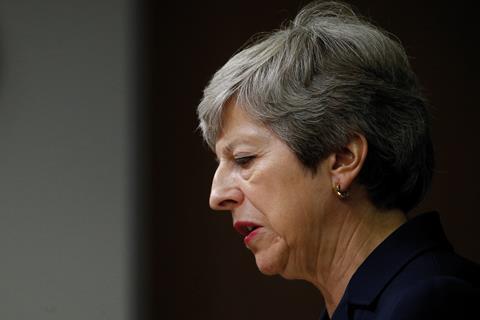
‘The government will scrap the Human Rights Act, and introduce a British Bill of Rights’
Conservative Party Manifesto, 2015
‘A true British Bill of Rights, decided by parliament and amended by parliament, would protect not only the rights set out in the convention, but could include traditional British rights not protected by the ECHR such as the right to trial by jury.’
Theresa May, prime minister, 2016
‘Now the [Human Rights] Act is 20 years of age, I think it needs to be looked at carefully. We’re working on ways in which we can examine that and do it in a mature and sensible way.’
Robert Buckland, justice secretary, 2020
Political games
Roger Smith, visiting professor of law at London South Bank University and a former director of the charity Justice, says this was true even of Tony Blair, who introduced the HRA. He believes the Blair government played political games, passing anti-terrorism legislation knowing that it would fall foul of the legislation. ‘They brought the HRA into disrepute by deliberately setting up confrontations which allowed them to appear tough.’
But as the debates over the 2010 coalition government’s proposed Bill of Rights proved, for others, opposition to the HRA in its current form is about more than political expediency.
Although the convention was originally proposed by Winston Churchill and shaped by British Conservatives, some modern Conservatives view the HRA as a threat to the UK’s sovereignty. Martin Howe QC, a member of the coalition government’s 2011 Commission on a UK Bill of Rights, says neither the convention nor the HRA, per se, are the problem. His issue is with the European Court of Human Rights in Strasbourg, which he describes as ‘completely out of control’, having ‘distorted the convention out of shape’.
‘The court in Strasbourg has invented new legal doctrines which are not in the convention and has extended interpretation of convention rights in ways which are simply not supported by the words of the convention or the manifest intention of the original drafters,’ Howe tells the Gazette.
The court’s application of the convention to overseas military operations is an example of its ‘legally indefensible’ jurisprudence, he adds.
In a landmark case, Al-Skeini v United Kingdom (2011), the European court declared that the convention applied to the Iraq conflict. But as the convention has a specific provision covering overseas territories for which states are responsible, such as the Crown dependencies, no extension of its applicability to areas of military occupation can have been intended, Howe maintains. Convention rights are also clearly inappropriate to apply in a war situation, he adds: ‘Article 5 would not allow detention of enemy combatants.’
The Overseas Operations Bill currently before parliament seeks to limit claims in relation to overseas military operations. This would amend the HRA and include a new ‘duty to consider derogation’ from the European convention in certain circumstances.

For Howe, the 2006 case of Hirst v United Kingdom No.2, which declared the UK’s automatic ban on prisoner voting rights to be in breach of the convention, is another bone of contention. The applicant relied on Article 3 of Protocol 1, which concerns free and fair elections. ‘There is nothing in the wording that creates an individual right to vote,’ Howe says, adding a clause specifying a right to vote was specifically rejected during the diplomatic conference at which the protocol was formed.
He turns to asylum rights, which are also on the government’s slate for reform. ‘The convention and its protocols do not mention asylum at all and there is a sound reason for that,’ Howe says. The convention was being drafted in parallel with the Geneva refugee convention, which at that time was focused on those fleeing from Nazi persecution before the war. ‘That was intended to give rights to asylum seekers but had a provision which said the host state is not required to accommodate a refugee who is a threat to its own security.’ Thanks to the Strasbourg court there is now a human rights regime governing asylum without the balances of the Geneva convention, he argues.
The court is ‘impossible to reform’ so the best thing to do is withdraw from both court and convention in favour of a UK Bill of Rights, he concludes. This would leave the UK in the company of Belarus as a non-signatory to the convention. But as Howe points out, Russia is a signatory and simply ignores it when it wants to. The withdrawal could also make human rights more popular in the UK, he insists.
‘When we say that things which a lot of people find reasonable, such as denying prisoners the vote, are “against human rights”, we are saying those opinions are illegitimate,’ Howe continues. ‘A home-grown Bill of Rights is more likely to obtain popular consent and acquiescence.’
He concludes: ‘Where I differ philosophically from many participants in this field is that I oppose the belief that lawyers and judges should rule the world, that we should be arbiters of what goes on and that democracy should operate in the spaces that we permit. A system of protection of rights can only be justified if they have a democratic basis. It’s an abuse of the democratic process to extend them beyond what was intended.’
Jonathan Cooper, barrister and human rights specialist at Doughty Street Chambers, does not agree but is less negative than one might expect about the possibility of withdrawal from the convention.
‘So long as we maintain the scheme of the HRA – the Section 6 obligation on public authorities and the Section 3 requirement on interpretation of legislation – it doesn’t matter if our rights don’t come from the convention but from a different catalogue of rights. If it makes the opponents of the HRA happy to remove the word “European”, then so be it.’
A much bigger risk, he explains, is that Section 3 will be watered down so that courts are only required to take human rights into account or into consideration, so the obligation will be less forceful than with the current test, or that there will be moves to remove rights protection from people who are not UK citizens.
But ultimately Cooper is confident the act will survive for many more birthdays to come: ‘The country is going through a terrible crisis which has involved all sorts of human rights violations and has affected us all. Who would have the temerity to repeal it now, when it is the instrument that will help us understand, through litigation, or enquiry, what happened and where the failures are?’
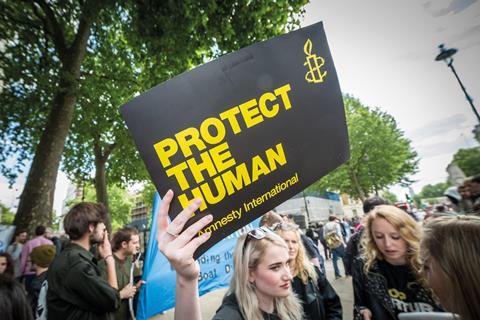
Melanie Newman is a freelance journalist























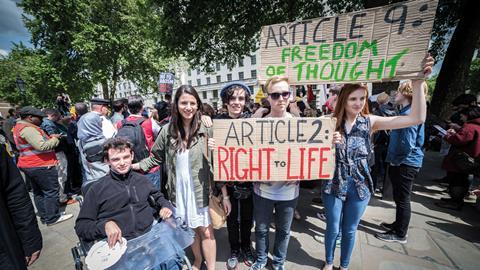








1 Reader's comment